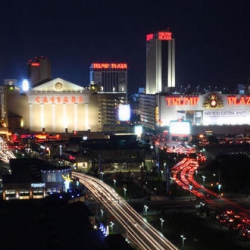Credit rating companies Standard & Poor’s and Fitch Ratings each expressed concern about Atalntic City’s casino industry due to the prospects of increased local competition in the near future. Much of the concern appears to be from the Hard Rock Atlantic City Casino, which is expected to open in May 2018.
Atlantic City’s casinos have had a recovery since the local gaming economy bottomed out in 2014. Four casinos closed and a fifth entered bankruptcy in 2014 — and that casino (Trump Taj Mahal) eventually closed.
The closures helped the remaining 7 casino operations. All seven make a profit now, while those that were profitable before have seen boosted revenues. With AC’s online gambling revenues increasing over time and the prospect of legal sportsbooks, Atlantic City’s recovery appears steady, if unremarkable.
Hard Rock Atlantic City
The Hard Rock Atlantic City is an entirely new operator that could cannibalize revenues from the existing 7 casinos. Hard Rock International plans to invest $500 million in a renovation project for the former Trump Taj Mahal, which the Seminole Tribe of Florida bought from Carl Icahn.
A possible reopening of Revel Casino also complicates matters, according to S&P and Fitch’s Ratings. Both also indicated that the opening of the MGM Springfield in Western Massachusetts in October 2018 could impact Atlantic City’s recovery.
Colin Mansfield Report
The Press of Atlantic City cited a report by Colin Mansfield, a leading analyst in the gaming, lodging and leisure sector for Fitch’s Ratings. In the report, Mansfield wrote, “There is a concern with the increased supply that will be created by the opening of the Hard Rock. The market has shown signs of stabilization after the closures, the remaining operators are seeing increased profits and more supply will take away from the existing properties.”
The same article by the Press of Atlantic City cited a report on Atlantic City’s credit rating from Standard & Poor’s. The report stated, “While there could be short-term economic and budgetary gains, they are unlikely to improve state credit quality. With declining tribal gaming revenues in Connecticut and the erosion of the Atlantic City gaming monopoly in New Jersey, long-term risks from commercial casino gaming are an ongoing credit risk.”
Standard & Poor’s Report
The S&P credit report noted that the northeast region continues to fill with more land-based casinos, while population growth and gaming habits among the younger demographic do not match the building craze. With an increasingly saturated gaming market, S&P noted, “As states in the region continue their gambling expansion, coupled with the region’s weak demographic trends, the likelihood that these revenues will meaningfully supplement state revenues over the long term diminishes and will have long-term credit implications.”
As more states face budget crunches, more states look to gambling as a way to increase tax revenues without raising property taxes or income taxes. Where Nevada and New Jersey were the only states with brick-and-mortar casinos 30 years ago, nearly 40 states have land-based casino now. The market is fragmented, so Atlantic City casinos have to rely more-and-more on New Jersey gamblers.
Worst Threats to Atlantic City Recovery
Of the various factors, the opening of the Hard Rock Atlantic City seems to hold the most dangerous for the other 7 existing casinos in the city. The Seminole-owned Hard Rock brand has several successful operations and knows how to manage a successful casino operation. While Glenn Straub’s Revel/Ten Casino would be housed in a beautiful skyscraper, it is still uncertain if Straub would bring in the kind of management which could produce a successful business.
More uncertain is whether Glenn Straub can ever secure alcohol and gaming licenses from the State of New Jersey. For whatever reason, the licensing process for both have been held up for years now. The lawsuits the Straub has filed against the regulators involved probably does not help matters. No matter the cause of the delays, Revel Casino is uncertain to be open again, unless a sale happens.
The fact is, though, both Hard Rock Atlantic City and Ten Casino would create jobs. Whether those would be permanent jobs is another matter, but that might not be the biggest concern to out-of-work Atlantic City workers in 2018.
North Jersey Casinos’ Impact
Speaking of 2018, the November midterms elections would be the first time that a North Jersey casino referendum could appear on a statewide ballot again. The issue of North Jersey casinos in the Meadowlands, Newark, or Jersey City came up again in the recent gubernatorial debate between Kim Guadagno and Phil Brown. North Jersey casinos likely would be the death knell of one or two Atlantic City casinos, because they doubtless would cannibalize business from the northern half of the state.

